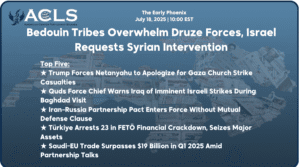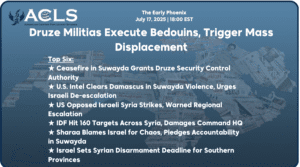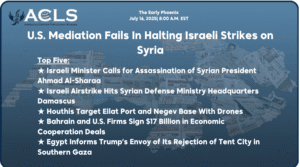Middle East Tensions Escalate: A Comprehensive Analysis of Regional Conflicts and Failed Diplomacy
By: Rania Kisar
The Latest ISRAEL-HAMAS WAR Escalation.
The seven-day truce concluded on Friday morning as Hamas did not provide a list of the women and children it intended to release and initiated rocket launches just an hour before the truce’s scheduled end, resulting in the return of all women and children hostages.
This marked a significant failure in the shuttle diplomacy efforts led by the United States, Egypt, and Qatar. Hamas released 105 civilian hostages (comprising 81 Israelis, 23 Thai nationals, and one Filipino), leaving 137 hostages still in Gaza. In parallel, Israel released 210 Palestinian security prisoners, specifically women and minors, and facilitated daily deliveries of 200 trucks, including four fuel tankers and four cooking gas tankers to Gaza.
Upon resuming military operations, the IDF announced the elimination of a Hamas commander, Wissam Farhat, responsible for directing the attack on Nahal Oz on October 7. Farhat was also implicated in the 2014 attacks on the IDF, which led to the kidnapping of IDF soldier Oron Shaul.
Concurrently, Hamas announced the killing of Israeli soldiers stationed northwest of Gaza City during the same time when Israel intensified its raids on the strip. The Israeli army did not comment on Hamas’ announcement.
Avichay Adraee, the Israeli army spokesman, stated on Saturday that dozens of rockets, shells, and other weapons were discovered under boxes belonging to the United Nations Relief and Works Agency for Palestine Refugees (UNRWA) in the northern Gaza Strip. The Israeli military’s impending operation in southern Gaza is motivated by intelligence obtained from hundreds of militants captured in the north, believed to enable them to locate and target Hamas leaders.
The Israeli Defense Forces (IDF) announced evacuation maps for residents of Khan Yunis, promising to minimize civilian casualties. Despite this pledge, the situation became challenging when they conducted over 400 attacks in a single day, resulting in nearly 700 deaths.
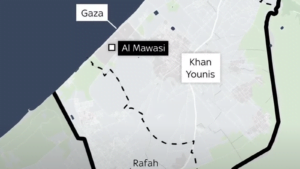 Source: Mutitu
Source: Mutitu
The IDF succeeded in destroying 500 out of 800 tunnels discovered in Gaza. However, this significant increase in casualties raises questions about the efficacy of the IDF’s strategy to conduct targeted attacks that aim to reduce the loss of civilian lives. Adding to the complexity, Israel’s ambassador to the UK revealed the establishment of a “Mawasi” safe zone in southern Gaza. Nevertheless, a Sky News team found no evidence of aid, food kitchens, or assistance in this designated area.
 Source: Al Jazeera
Source: Al Jazeera
 Source: Al Jazeera
Source: Al Jazeera
European nations are displaying contrasting approaches to the Israel-Hamas conflict. The French President expressed concerns over Israel’s extended military actions against Hamas, potentially lasting years, and has called for Israel to clearly state its goals. He emphasized the dangers of ongoing bombings and the possible destruction of whole areas or civilian infrastructure.
In contrast to France’s stance, the United Kingdom has adopted a more proactive role in the Israel-Hamas conflict. It has been conducting reconnaissance flights over Israel and Gaza with a specific focus on aiding hostage rescue efforts.
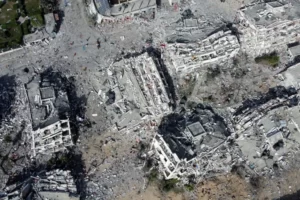 Source: Aljazeera
Source: Aljazeera
These operations are exclusively aimed at gathering intelligence for the safe recovery of hostages. Hamas and Islamic Jihad have criticized the UK’s surveillance activities, accusing Britain of siding with Israel and ignoring historical grievances, particularly those related to the Balfour Declaration. The UK Ministry of Defense clarified that these flights are crucial for a hostage rescue mission and emphasized their commitment to the safety of British nationals.
This Monday, Israeli experts announced the presumed deaths of several hostages in Gaza, based on the analysis of video footage and witness statements that suggested lethal injuries. This effort aims to provide closure to the families of the hostages. Currently, about 137 individuals remain detained in Gaza, with reports indicating 7 deaths since the ceasefire.

Source: CTECH
Russia’s President Putin seems to be blending the conflicts in the Middle East and Ukraine into a singular online narrative, utilizing the Israel-Hamas situation to sow
discord in Western alliances and divert attention from Ukraine.
Kremlin-linked social media accounts are actively disseminating misinformation about Hamas and NATO, aligning with the increase in violence and protests. Observers note Putin’s reluctance to condemn Hamas and his alliance with Iran, reflecting a strategy influenced by his KGB background aimed at countering U.S. influence and disrupting global stability.
=====================
IRAN
Israel Leads in Countering Iran’s Threat: A Call for U.S. to Follow Suit
Israel’s proactive measures against Iranian influence across its northern borders are evidently becoming a rightful priority. The Israeli airstrikes on the outskirts of Damascus, which resulted in the deaths of two IRGC officers, further underscore Syria’s critical role in Iran’s ‘Axis of Resistance,’ serving as a conduit for arms to Hizballah.
 Source: Iran International
Source: Iran International
This concern is amplified by recent Hamas operations,” explained Dr. David Adesnik, a leading FDD analyst on Syrian affairs. In response to a question about Israel’s killing of the two officers, Iranian foreign ministry spokesman Kanaani confirmed this publicly, stating that nothing will go unpunished and stressing that any action against Iran’s interests and its advisory forces in Syria will not occur without a response.
In the wake of Israeli airstrikes near Damascus, the Chief of the General Staff of the Iranian Forces embarked on a two-day visit to Iraq, purportedly to initiate a military student exchange program between Iran and Iraq. Coinciding with this visit, a group aligned with Iran launched a series of drone and missile attacks against U.S. military bases in the region.
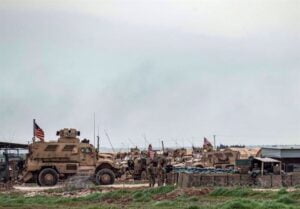 Source: TasnimNews
Source: TasnimNews
These retaliatory strikes targeted the Green Village base in Syria, the Ain al-Assad base in western Iraq, and the “Kharab al-Jir” airport base in northern Syria. Other Iranian factions in northeast Syria were reportedly vacating three of their headquarters, in Deir Ezzor, however.
The IRGC Public Relations also issued a statement condemning Israel’s aggression in Gaza and praising the martyrdom of its IRGC officers, emphasizing the symbol of the ongoing resistance. Iran also responded to the State Department annual report on terrorism by accusing Washington of using this term as a tool against countries that are not aligned with its policies, adding that this report lacks international credibility. The Iranian government also announced forming a special working group to halt fuel supply to Israel, aiming to engage with Israeli fuel suppliers and prevent the strengthening of Israel’s fuel reserves.
Iran’s president Raisi said that his country’s support for Gaza is in total compliance with the Iranian constitution and noted the massive worldwide rallies as indicators that the blood of Palestinians has overcome the arrogant system’s media empire.
=====================
IRAN’s War Against the United States
Shortly after the U.S. Navy USS Carney intercepted Houthis drones in the Red Sea using its Phalanx area weapon, Iran introduced its new unmanned submarine. This submarine is capable of operating at depths up to 200 meters for a continuous 24-hour period.
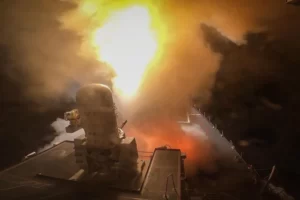 Source: WarriorMaven
Source: WarriorMaven
While a direct comparison may seem incongruous, the timing of this revelation appears to be a clear demonstration to Iran’s alleged preparedness in confronting threats. Furthermore, it confirms Dr. Russell Berman, Director of the Middle East Institute at Hoover Institute, conclusion that Iran feels it is at war with the U.S. (Watch Arabic translated video).
An Israeli newspaper downplayed the Houthi militia’s ability to harm commercial ships in the Red Sea, citing advanced protections and technological challenges. Despite capturing the “Galaxy Leader,” Israel views these attacks as minimal threats, emphasizing the robust design and defense systems of these vessels.
This Monday, in a preemptive strike, an American drone targeted militants near Kirkuk, Iraq, who were planning an attack on the Harir Air Base in Erbil, resulting in five fatalities and three injuries among the “Harakat al-Nujaba” group, linked to Iran.
Iran and Cuba Together Against Israel, Challenging the U.S.
In Iran’s further attempts to be allegedly rallying support against its perceived enemy at war, the United States of America, Iranian media highlighted the scheduled reciprocal visit of the handpicked Cuban President Miguel Diaz-Canal to Tehran, noting that in-depth discussions about the the Israel-Hamas conflict would take place, signaling Cuba’s role and potential implications for U.S. foreign policy.
 Source: abc
Source: abc
During a phone call with Japan’s Prime Minister Fumio Kishida, Raisi suggested that various countries, including Japan, can directly observe the level of support for the rights of the Palestinian nation by holding referendums, although Western countries are very afraid of holding such polls.
Iran’s foreign minister subsequently launched his own attack on Israel citing documents obtained by Hamas on October 7 that support the hypothesis that Israel is planning to displace the people of Gaza to Egypt, and the people of the West Bank to parts of Jordan. He continued to stress, however, that Tehran is not looking to expand war in the region during a phone call with EU’s Joseph Borell.
=====================
Iran’s Descent into Despotism: Khamenei’s Reign of Fear and the West’s Moral Imperative.
The recent call for “absolute obedience” to Supreme Leader Ali Khamenei and the alarming escalation of civilian executions clearly demonstrates the nightmare Iranians have had to endure for forty years. Khamenei’s prolonged rule has led to a society stifled by oppression and a failing state, as seen in the economic downturn and public dissent.
The regime’s insistence on absolute control, even in the face of international condemnation, underscores the need for U.S. policymakers to leverage these internal atrocities to exert pressure on Iran, promoting regional stability and human rights. Analysts say that Iran is exploiting the global focus on the conflict in Gaza as a pretext to carry out an “unprecedented” number of executions
The European Union has decried over 600 executions this year as “cruel and inhumane,” highlighting the regime’s oppressive tactics, including lack of legal representation and family contact for the accused.
 Source: Iran International
Source: Iran International
This surge, a 56.5% increase in November with 122 individuals executed, includes minors and political prisoners. Among them, a young man executed for defending a girl and a 17-year-old hanged for a street fight, blatantly disregarding international norms.
=====================
Iran’s Gasoline Crisis: A Ticking Environmental Time Bomb.
Iran’s Ministry of Petroleum confidential document reveals that 80% of its gasoline is substandard, with harmful chemicals like ‘MTBE’ mixed daily. Producing 100-110 million liters daily, Iran’s outdated refineries contribute to severe air pollution and a doubling of greenhouse gas emissions over 20 years. Facing a gasoline shortage, Iran now imports standard gasoline, mainly for major cities. This situation is crucial for the U.S., impacting regional stability, global energy markets, and environmental concerns. It provides leverage in U.S. diplomatic negotiations with Iran, influencing foreign policy, particularly in nuclear talks and regional security issues.
=====================
EGYPT
Escalating Tensions: Egypt’s Response to Gaza Crisis
As Israeli military operations in Gaza intensify, leading to Palestinian displacement towards Egypt, the situation echoes the 2008 crisis, posing significant humanitarian and security challenges for Egypt.
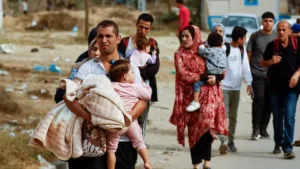 Source: Alhadath
Source: Alhadath
The United Nations and regional sources report thousands moving from northern and central Gaza to the south, potentially leading to a mass exodus into Egypt and establishing a buffer zone.
Egypt’s Ministry of Foreign Affairs strongly opposes the forced displacement of Palestinians, emphasizing adherence to international humanitarian law and the Fourth Geneva Convention. Analysts indicate Israel’s strategy might pressure Palestinians to move towards Sinai, aligning with Israel’s goals to annex Gaza land This could lead to confrontations and further reduce Gaza’s population density.
Egyptian military experts, including Major Generals Samir Farag and Nasr Salem, assert Egypt’s readiness to handle potential border crises, balancing humanitarian aid for Gaza with national security. Egypt’s response involves diplomatic efforts for a sustainable conflict resolution. In conclusion, the Gaza situation and its impact on Egypt’s borders underscore the need for balancing humanitarian aid, national security, and regional stability.
=====================
TURKIYE
The US, Turkiye, and Hamas – A Diplomatic Tightrope Leading to No Good.
Despite no confirmations that Turkiye transferred any funds to Hamas since the October 7th attack, US Treasury Undersecretary for Terrorism and Financial Intelligence Brian Nelson visited Turkiye last week to express Washington’s “deep” concern about Ankara’s relations with Hamas.
Turkiye’s engagement with Hamas has been a notable aspect of its foreign policy, especially since 2006 when Hamas won the Palestinian legislative elections, leading to tensions with Israel and concerns from the United States and other countries that label Hamas as a terrorist organization. Nelson pointed out that Ankara had previously helped Hamas receive funding, and called on Turkiye to take strict measures against possible future transfer of funds.
President Erdogan’s response demonstrates the emergence of alarming strains in American-Turkish relations. He reiterated that Turkiye’s foreign policy is based on the interests and expectations of the people.
Furthermore, he maintains that Turkiye does not view Hamas as a terrorist group, adding that it is not possible to exclude Hamas from any possible solution to the conflict in Gaza. The Turkish president continued to condemn Israeli approaches as “state terrorism,” calling Benjamin Netanyahu, “the Butcher of Gaza,” and his calls for a two-state solution. On Monday, the Turkish president stated that Netanyahu should be tried like Milosevic.
Hakan Fidan, minister of Turkiye’s foreign affairs, announced that his country is preparing an initiative with main provisions that will be presented to a wider audience. The initiative stipulates different countries in the region bear the responsibility of becoming the guarantors of Israel and a Palestinian state. Fidan explained that only in this way can a lasting peace be guaranteed.
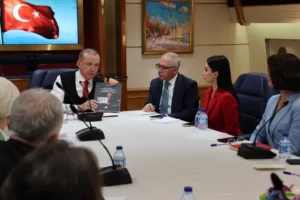 Source: Al Jazeera
Source: Al Jazeera
Israel’s response to Erdogan was not long in coming, as its Foreign Minister Eli Cohen said – through his social media accounts – “Go ahead and host in your country the Hamas terrorists who were not eliminated and fled Gaza,” and Cohen added, “We will liberate Gaza from Hamas, for the sake of Israel’s security.” In order to create a better future for the residents of the region.”
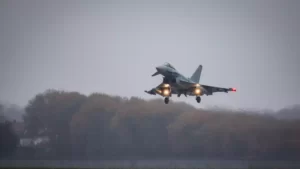 Source: Daily News
Source: Daily News
In other news, important to Turkiye, Germany blocked the sale of the Eurofighter citing natural gas drilling activities in the eastern Mediterranean Sea. Last week, Türkiye’s Defense Minister Yaşar Güler declared the nation’s intention to acquire Eurofighter jets, opting for them over the controversial F-35s from the United States. This decision follows Türkiye’s expulsion from the F-35 program in 2019, making the modernization of the country’s air force a top priority.
=====================
LEBANON
Border Tensions New Phase of Hostilities and Cyber Frontlines Led by Iran.
The recent escalation at the Israel-Lebanon border is being scrutinized for its complex nature, Hizballah’s involvement, and broader regional consequences. This escalation is defined by increased military actions and rhetoric, with Hizballah and the Israeli Defense Forces (IDF) engaging each other.
Hizballah’s actions hint at a strategic shift, possibly in reaction to regional situations involving Iran and Syria. Israel’s countermeasures show limited tolerance for Hizballah’s actions, focusing on deterrence. Concurrently, international diplomatic efforts to settle border disputes face resistance from Lebanese officials and Hizballah.
Additionally, the conflict encompasses cyber warfare between Israel and groups linked to Iran, Hizballah, and Hamas. This recent intensification represents a multifaceted mix of military, political, and cyber elements, influenced by regional power dynamics, Lebanese internal politics, and global diplomatic endeavors. The situation is dynamic, with possibilities for further intensification or a return to a tense but more stable status quo.
=====================
To stay up-to-date with our latest publications, subscribe here.
To inquire or request TV interviews with ACLS Experts, contact [email protected]
To participate in sharing your opinion and have your voice heard through the American Center for Levant Studies portal “Listen to the Voice of the People”, upload your blog at the bottom of this page.
In case you missed last week’s Early Phoenix, Go Here.

